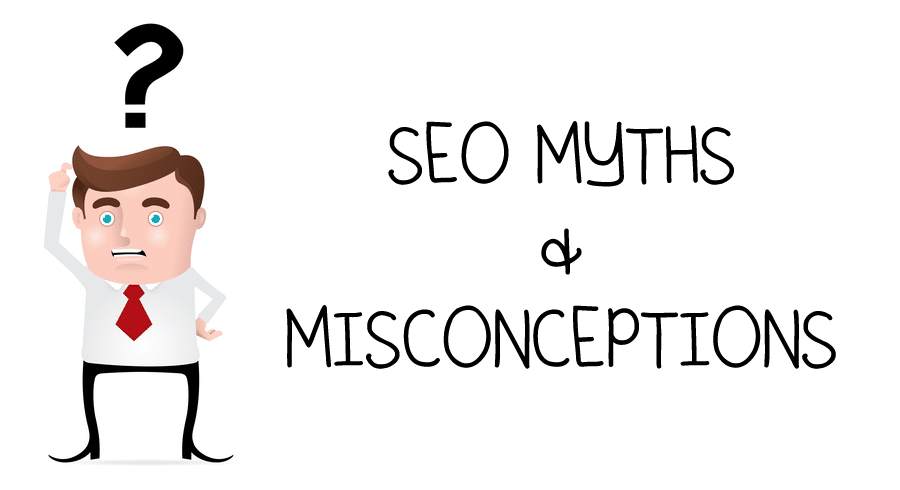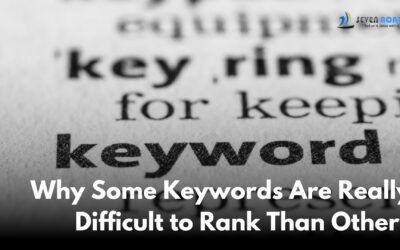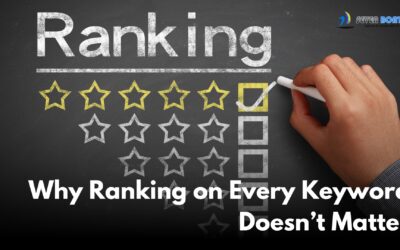
It is very difficult to spread around misinformation and misguided knowledge about age-old subjects like physics or even economics. That is because there are textbooks and archives to back claims and much is written about in the traditional sense. That is not the case for SEO. There are no century-old buildings housing departments to teach SEO.
There are books and journals available in print and online but much of it is written from practice and experience. This gives rise to a number of false information about this domain. I will discuss about some of these SEO myths & SEO misconceptions that I have come across in my work as an ‘SEO guy’!
SEO Myths #1: SEO is a kind of Ponzi scheme!
How wrong can anyone be! Many consider SEO to be nothing more than spam or even a scam! You cannot blame them for thinking so, though. I have come across several ‘SEO companies’ that deliver little after promising a lot. Like spiking up your website’s traffic by astronomical amounts in a matter of weeks, even days!
SEO is not that. SEO is a systematic and structured approach to achieve results. And these results don’t come in within a few days or even a specified period of time. You can only predict the time frame required to spike up traffic. There cannot be any assurances made in this regard. Get rid of these misconceptions and the larger myth of SEO being a kind of Ponzi scheme will be dispelled.
SEO Myths #2: Google can sort out your mess
Google is the biggest name on the internet. Yet, there are some areas where it will not come to your help. For example, if your website is a jumble of confused URLs, mismatched title tags and poorly written, irrelevant content, Google will not untangle or sort through it.
Despite all the algorithms and search crawlers, you have to understand that Google’s approach to websites is somewhat similar to that of human users. It steers clear of mess! Make it easier for Google to index your web pages by providing unique, value-added pages. Also, provide technical cues for the crawlers to find your web page from a million other choices that are available online.
SEO Myths #3: Rank 1 is all that matters
This is untrue as well. You will be surprised to find through a simple search that industry leaders in a particular domain may come in at rank 2 or 4. Does that affect their traffic? It does not. Because you have to keep in mind that more than the right keywords matching up to the search query, the content that goes along with the keywords is what matters more.
The long-tailed keywords are often the ones that bring you quality online traffic, as opposed to those few magical keywords that you feel are all-important. Online users as well as Google falls for quality content and not how you measure up against keyword research and application.
SEO Myths #4: Google Answers kill SEO
This one is a rather new one. Have you noticed how Google answers your question directly before throwing up search results? It is through a feature through which Google answers your queries. Does that kill the practice of SEO? That is where the myth seeps in. The answer is a thumping no.
If it were actually so, the number of internet searches and clicks on web links would go down drastically. Instead, it is going up! A Stone Temple study tells us that linked attribution comprises of about 74.3% of Google’s answers. It is also a fact that even when Google answers the question that a user types in, they still click through to the websites listed in the search results. In other words, SEO is still very much in the game.
SEO Myths #5: Social media does not link to SEO
True. And not true! True: social media networks like Twitter and Facebook are not used by Google directly in its ranking and indexing procedure. Not true: it has no effect on SEO. It does. When content is shared or distributed through social media, it surely rings a bell with the SEO division of your online business. With more links or mentions on social media, your linking structure is bolstered and that helps the SEO process in the larger scheme of things.
Top 3 SEO Myths You Need to Bust
SEO professionals often get mired up in myths that are born of hear-say information. This is even more so because SEO is one field that does not really have a formal training.
Most SEO professionals have become pro by picking up the tricks of the trade from seniors or from books and the internet. As a result, when one wrong idea gets mileage, it automatically becomes prevalent in the minds of many SEO professionals. Here are the top 3 SEO myths that you need to bust right now:
SEO Myth: Content Marketing is Everything
Content is king. True. But content is not everything in SEO. In the last couple of years, with Google coughing up updates to cover content marketing areas, most SEO professionals feel that quality content is all that they need.
That is wrong. Does Google or Twitter have content on their home pages? No. Instead, they give something to the user to do. Some form of engagement. You need to do the same on your websites as an alternative to content.
SEO Myth: Links are Everything
Another false assumption borne out of age old SEO practices! Links can be vital to the foundation of SEO but if you focus all your attention on building up links, you are missing the point. You need a robust online network to validate your online presence to the algorithms of Google.
Buying links or spamming links will not help your case. Rather, it will be a damp squib on your SEO efforts. Don’t make links the be-all and end-all of your SEO effort.
SEO Myth: Social Media is Everything
Facebook and Twitter are important add-ons to your SEO drive. They cannot be your SEO drive in themselves. Remember, your Facebook updates and tweets cannot be indexed or crawled on Google. Similarly, online users are now very wary of social media spammers and link pushers.
You cannot buy Facebook ‘like’s or have SEO executives creating random profiles to add friends and followers on Twitter. That is the part of social media marketing that we have left far, far behind. Look ahead and pick up social media as tools of engaging people rather than pushing yourself down unwilling throats.
SEO Myths that Cost You Online Leverage
Here are the top SEO myths that have become pronounced over the years. Read on and throw these myths out of your mind, if you have not done that already.
In the ideal SEO world, you would not depend on hearsay and whispered information while working on the online branding and internet marketing of your website. However that is exactly what is ruling the roost for some years now.
Amateurs handle SEO with little or no actual understanding of what qualifies as SEO and what are simply confused attempts at capturing SERP slots. But Google is not that forgiving anymore! It has launched a series of algorithms and updates that make life difficult for those who do not possess a clear understanding of SEO rules and norms.
Here are the top SEO myths that have become pronounced over the years. Read on and throw these myths out of your mind once and for all, if you have not done that already:
- Anchor Texts: A much abused knowledge of SEO, most think that using anchor texts on their primary, and sometimes, secondary keywords will get them brownie points on the SEO scene. That may have been true at a certain time in the last decade! Not anymore! With Google’ Penguin 2.0, the search engine giant maintains what is generally known as a link profile. It keeps track of all those anchor texts that you use to bring traffic to your website. Overdoing it or spamming on it will harm your website in a deeper way than you can think of.
- Lack of Strategy: You cannot be successful in SEO unless you have a strategy in place. Do not trust the judgment of the person who shouts out to get you on the SEO field. SEO is not just about cranking out content by the dozens using keywords or optimizing your website or even social media networking. SEO is about galvanizing all these platforms for some gainful end. You need a strategy to bind up these various platforms. You cannot work haphazardly on a loose-knit plan in order to make an impression on the SERP scene.
- Time Matters: A very wrong idea that some SEO firms spread around is that they can get you rankings on the SERP within a specified time span. Usually the span advertised is ridiculously short. Do not fall for such taglines. Organic SEO takes time to register, especially if you are in a business domain that has strong competition. No one can predict or guarantee SERP spots. It is only with time that you gain a toehold on the SEO scene and then take it from there on.
Common SEO myths you should understand carefully
- Keyword targeting became irrelevant after Google Hummingbird. (No, topical keywords are still very important)
- Having an XML sitemap will boost your search rankings. (No, google can find your pages automatically by following interlinks but it’s better to put a rightly structured sitemap containing even your images )
- Meta tags don’t matter.(Title tag and meta description matter a lot.)
- Use meta robots tag to specify indexable pages. (No, use robots.txt, search console, canonical tag etc)
- Top-level domains improve rankings. (No, anything that focuses on user experience & real value works)
- Including a target keyword in anchor text no longer matters in SEO.(Yes it matters a lot. Rotate relevant anchor text & phrases)
- Google will find your fresh content and index it. (Yes but takes time. Share on social media, do url inspection & indexing request in search console)
- Hire an SEO agency to get top rankings fast (No, select the right agency)
- Guest blogging is dead (Right guest blogging & influencer marketing can do wonders)
- Keyword research is not necessary (No, long-tail keywords are necessary)
- Paid search improves organic results (No,it increases paid traffic & some sort of branding)
- Claiming your Google listings will increase your search traffic (No, work on Google My Business Optimization)
- Long-form content = top rankings (No, add real value with it. Then it will work)
- Linking out to authority sites sends organic visitors away (No, it helps in trust building)
Top 5 Local SEO Myths Busted

Local SEO is an integral part of the digital marketing activities for your company but sadly there are a few local SEO myths that people believes in. The problem with acquiring knowledge in a dynamic field like digital marketing is that you often end up picking wrong bits of information from a dubious source. There is no definitive text as such, with all the information coming from blogs, articles, web pages and the like. In such cases, the information becomes as good as the source. You read the wrong blog, you learn the wrong things! This has led to much misinformation about the digital marketing world, including SEO.
I have written extensively about myths wafting around in the SEO and digital marketing world. Many of them are on this blog. Today I will confine my myth-busting to local SEO. This is another area where brands and companies end up doing the wrong things with the right intention. Thanks to more companies offering online service, local SEO is a bigger scene today than last year. Here are the top 5 local SEO myths busted for you!
Local SEO Myths #1: Verified pages mean ranking status
It is a myth that unverified pages do not make ranking status. There are scores of unverified web pages that are picked up and indexed by Google. It is true that the process of verification gives a boost to the ranking status. It is untrue, however, that not verifying leaves you out of the fray. Verification ensures that the webmaster or owner gives more details about the website or web pages to Google. This additional information becomes the determining factor in pulling your website up the ranks. There is nothing more to it!
Local SEO Myths # 2: Google + is not a ranking factor
Many in the local SEO scene believe that posting frequently on Google + will mean better chances at ranking. That is a complete myth. You cannot find anything about a brand or company on Google + unless the searcher uses the name of the brand or company. Local searches do not list Google + pages on the SERP. You may have heard something on the contrary from agents at Google My Business! Don’t believe when they say that Google + affects local SEO.
Update 2019 – Google has stopped the Google Plus service for public except Gsuite members (for your internal team)
Local SEO Myths # 3: Deleting from Google My Business is not deleting from Google
Some may want to delete their listing from Googly My Business. When they try to do so, they are faced with a severe choice about their intention to delete content. Local SEO players should not feel intimidated by this warning! Deleting your listing from My Business is not scratching out your existence from Google itself. The only thing that happens when you delete from My Business is that the listing becomes unverified. I have already mentioned what the status of unverified lists is in respect of Google’s local ranking.
Local SEO Myths #4: Optimizing SEO Maps is different from Organic SEO
There is a prevalent perception that if you want to hit the local SEO scene hard, you need to optimize Google Maps separately along with organic SEO. These two are components of the same coin. You cannot achieve one without the other. Neither can you work on them separately. To make your presence felt on the local SEO scene, you need to optimize organically. That will have an impact on your status on Google Maps. Local listings that rank have a 75% chance of making the first SERP in an organic way.
Local SEO Myths #5: Believe Google’s Employees on Ranking Factors
This is something that I have learnt and witnessed over the years. Blog posts or other content put out by Google’s employees do not always convey the right message. Experts in the industry have rightly pointed out that these employees have no incentives whatsoever in giving you a sneak peek. Some myths generated by these employees have gone bust over time.
For example, the claim that duplicate listing take care of themselves after a while, or that posting on Google + affects local SEO ranks. These clearly indicate that you are better off reading the pros of the industry and rely on verifiable research stats.
Take note of these game-changing ideas when you embark on your local SEO projects. Do write to me with your experience!
The Final Word
Understand SEO. Analyze and dissect it. Explore the options. But take nothing for granted because it trickles down from a source that you do not fully comprehend. It may be well-intended but ill-informed. I can say this from personal experience. Check up facts and figures before taking in information about SEO.
Do you have such myths or anecdotes to share? Paste them here and we can all talk about it.
Some SEO Points Much Discussed
In the world of SEO, some points tend to keep showing up their ugly heads every now and then. No matter how much you try to bury them because of their redundancy in the present times, some blogger or self-proclaimed SEO expert will bring them up to the surface. What usually follows is a discussion that, like every single time in the past, does not head to a conclusion. The first, and probably the most discussed, point in this vein is the interpretation and analysis of Google’s updates and algorithms.
Google comes up with some updates and changes that affect search engine optimization directly. Google puts up blog posts or videos to announce and explain those updates. Before the SEO community gets to sink their teeth into the message and the intended purpose of the message, bloggers all over the world are busy giving you insights and scoops that they claim to be privileged information! More often than not, you will find that the updates have not even come into effect and bloggers already begin to tell you how your website will be affected.
Unless they have been on the decision-making team of Google, there’s no way they can know for sure what those updates will mean to the SEO world. For example, when the Panda and Penguin updates were announced, or the Hummingbird for that matter, the SEO domain went into a tizzy trying to make sense of those updates. There were clear indications on the part of Google that if you are doing the SEO work right, there won’t be any adverse effects on your website. But such assurances are thrown to the dogs primarily because bloggers thrive on gimmicks wrapped as news.
The same goes for Page Ranks and rankings of keywords. We have got umpteen number of discussions on SEO blogs and forums to thrash it out that these two parameters don’t matter in the world of search engine optimization anymore. No internet marketer will pick a website with higher Page Rank if that site is not relevant to the purpose. Similarly, higher ranks in the SERP do not automatically translate into online sales conversions. These parameters of SEO success have died their natural deaths and need no exhumation!
SEO is now BRANDING, the way you do it offline, same is applicable for online by means of content & other marketing techniques.
Related Reading:











Some of these myths are very funny, and bizarre. Very helpful article for everyone. would recommend your blog to others for better understanding of SEO and how its work process.
Thank you Ahana. Here is a list of few more SEO myths :)
Keyword density heavily improves page ranking. …
Social signals are only important ranking factor. …
Links really don’t matter. …
Content really doesn’t matter. …
SEO is a one-time activity. …
Only the #1 position on Google matters. …
Buying 20,000 backlinks for $10 will work. …
Using Google Ads will increase organic ranking.
Good article and cover all typical points of SEO myths which is necessary to follow all steps for getting better responce in digital marketing era. SEO is the one of the biggest factor of Marketing . Well discuss about SEO in a very easy and simple way,
Thank you Aman for your comment. Few more SEO myths to look into –
1. You Can Guarantee #1 Rankings. [Not true]
2. SEO is Cheap [Not true]
3. SEO is Always Less Costly Than PPC [Not always true]
4. It Takes very long (12 months) to See Results from SEO [Not always true]
5. You’ll See Dramatic Improvement Immediately [Not true]
6. Every Website Needs SEO [Not necessarily ]
7. Every Website Needs a Blog [Not necessarily ]
8. SEO is All About Technical Stuff [No]
9. SEO is Just Updating Page Titles and Meta Descriptions [No]
10. More Is Better When It Comes to Backlinks [No]
11. Spamming Blog Comments is a Great Link-Building Tactic [No]
12. Nofollow Links are No-Value Links [Not true]
13. You Shouldn’t Link Out to Other Sites [Not true]
14. High-Volume Keywords Are the Best Keywords to Target [Not true]
15. Your Domain Name Should Include a Keyword [Not always true]
16. Making Your Keywords Bold Will Help You Rank Higher [Not always true]
17. Respinning Content and Repurposing Content Are the Same [Not true]
18. Hosting Your Blog on a Different Domain is Fine [Not true]
Would definitely recommend it to people who want to understand SEO. Really deepened my understanding of SEO.
Thank you!
Thank you
Woh! That is some Mythbusters worthy content right there. Thanks for debugging all the wrong information about SEO and digital marketing in general. That myth-busting about Anchor Texts was a real eye-opener for me.
Thank you Subham